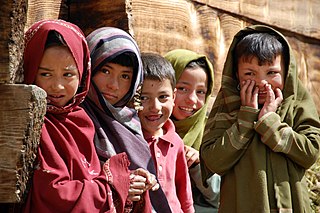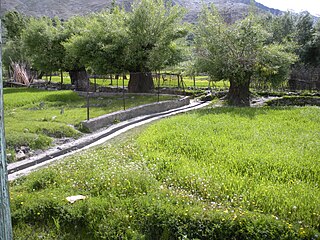Related Research Articles

The Deobandi movement or Deobandism is a revivalist movement within Sunni Islam that adheres to the Hanafi school of law. It formed in the late 19th century around the Darul Uloom Madrassa in Deoband, India, from which the name derives, by Muhammad Qasim Nanautavi, Rashid Ahmad Gangohi, and several others, after the Indian Rebellion of 1857–58. They opposed influence of non-Muslim cultures on the Muslims living in South Asia. The movement pioneered education in religious sciences through the Dars-i-Nizami associated with the Lucknow-based ulama of Firangi Mahal with the goal of preserving traditional Islamic teachings from the influx of modernist, secular ideas during British colonial rule. The Deobandi movement's Indian clerical wing, Jamiat Ulema-e-Hind, was founded in 1919 and played a major role in the Indian independence movement through its participation in the Pan-Islamist Khilafat movement and propagation of the doctrine of composite nationalism.

Ladakh is a region administered by India as a union territory and constitutes an eastern portion of the larger Kashmir region that has been the subject of a dispute between India and Pakistan since 1947 and India and China since 1959. Ladakh is bordered by the Tibet Autonomous Region to the east, the Indian state of Himachal Pradesh to the south, both the Indian-administered union territory of Jammu and Kashmir and the Pakistan-administered Gilgit-Baltistan to the west, and the southwest corner of Xinjiang across the Karakoram Pass in the far north. It extends from the Siachen Glacier in the Karakoram range to the north to the main Great Himalayas to the south. The eastern end, consisting of the uninhabited Aksai Chin plains, is claimed by the Indian Government as part of Ladakh, but has been under Chinese control.

Jamaat-e-Islami, or Jamaat as it is commonly known, is an Islamist political party based in Pakistan and founded by Abul Ala Maududi. It is the Pakistani successor to Jamaat-e-Islami, which was founded in colonial India in 1941. Its objective is the transformation of Pakistan into an Islamic state, governed by Sharia law, through a gradual legal, and political process. JI strongly opposes capitalism, communism, liberalism, and secularism as well as economic practices such as offering bank interest. JI is a 'vanguard party', whose members are intended to be leaders spreading party beliefs and influence. Supporters not thought qualified to be members may become 'affiliates', and beneath them are 'sympathizers'. The party leader is called an 'ameer'. Although it does not have a large popular following, the party is quite influential and considered one of the major Islamic movements in Pakistan, along with Deobandi and Barelvi.

Kargil district is a district in Indian-administered Ladakh in the disputed Kashmir-region. It is one of the two districts comprising the Indian-administered union territory of Ladakh. The district headquarters are in the city of Kargil. The district is bounded by the Indian-administered union territory of Jammu and Kashmir to the west, the Pakistani-administered administrative territory of Gilgit–Baltistan to the north, Ladakh's Leh district to the east, and the Indian state of Himachal Pradesh to the south. Encompassing three historical regions known as Purig, Dras and Zanskar, the district lies to the northeast of the Great Himalayas and encompasses the majority of the Zanskar Range. Its population inhabits the river valleys of the Dras, Suru, Wakha Rong, and Zanskar.

The Baltis are a Tibetic ethnic group who are native to the Pakistani-administered territory of Gilgit−Baltistan and the Indian-administered territory of Ladakh, predominantly in the Kargil district with smaller concentrations present in the Leh district. Outside of the Kashmir region, Baltis are scattered throughout Pakistan, with the majority of the diaspora inhabiting prominent urban centres such as Lahore, Karachi, Islamabad and Rawalpindi.
In Shi'a Islam the guidance of clergy and keeping such a structure holds great importance. There are several branches of Shi'ism, of which Twelver Shi'ism is by far the largest, and each of the branches has different clergy structures. Individual clerics are referred to as mullā or ākhūnd, but since those terms have developed "a somewhat pejorative connotation" since at least the 1980s, the term rūḥānī has been "promoted" as an alternative, "especially by the clerical class itself".

Sankoo is a town in a valley within the Kargil district of the Union Territory of Ladakh, India. This township is located approximately 42 kilometers south of Kargil city. The valley is shaped like a bowl and is fed by several large tributary streams of the Suru River, as well as the Nakpochu river.
Noorbakhshia or Nurbakhshia is a distinct school of Islamic jurisprudence that places significant emphasis on the concept of Muslim unity. Its doctrinal framework is firmly rooted in core Islamic tenets, including belief in Allah, Angels, Prophets, the Day of Judgment, the Quran, and other sacred Islamic scriptures revealed to preceding Prophets. These fundamental beliefs and practices are elucidated in foundational texts such as "Usool Aitaqadia" and "Fiqh ul Ahwat", authored by Syed Muhammad Nurbakhsh Qahistani.
The five Martyrs were five scholars (ulama) of Shi'i Islam, living in different spans of history, who were executed by their respective Sunni regimes. The Shia remember them by the term Five Martyrs. A leading work on the biographies of the martyrs was Shuhada-e Khamsa kay Halaat-e Zindagi by Grand Ayatollah Muhammad Hussain Najafi.
Shia Islam was brought to the Indian subcontinent during the final years of the Rashidun Caliphate. The Indian subcontinent also served as a refuge for some Shias escaping persecution from Umayyads, Abbasids, Ayyubids, and Ottomans. The immigration continued throughout the second millennium until the formation of modern nation states. Shi'ism also won converts among the local population.

Anti-Shi'ism or Shiaphobia is hatred of, prejudice against, discrimination against, persecution of, and violence against Shia Muslims because of their religious beliefs, traditions, and cultural heritage. The term was first used by Shia Rights Watch in 2011, but it has been used in informal research and written in scholarly articles for decades.
The Abaqati family is a sub-branch of the Jarwal-Kintoor branch of Nishapuri Kazmi-Musavi Sayeds who trace their lineage to the Islamic prophet Muhammad through the eldest son of the great-grandson of Musa al-Kadhim, he was given a jagir in Jarwal-Kintoor by Sultan Muhammad Tughluq, his other two brothers were given jagirs in Budgam, Kashmir and Sylhet, Bengal.

Hujjatul Islam Sheikh Muhammad Mussa Shariefi was a senior Islamic Twelver Shia religious scholar/alim from the Kargil district of Ladakh. He was renowned for his philosophical and mystical Friday prayer sermons which were always attended by thousands of people from the length and breadth of Kargil. He became the Imam e Jumu'ah of Jamia Masjid Kargil after the death of the immensely popular Shia mystic and scholar, Hujjat ul Islam wal Muslimeen Aqa Sheikh Khanteypa. He gained immense popularity for his usage of the local dialect for delivering his Friday sermons.

Haji Asgar Ali Karbalai is an Indian political and social leader from Kargil, Ladakh. He has been the chief executive councillor of Ladakh Autonomous Hill Development Council, Kargil twice. As of December 2014, he is a member of the Legislative assembly of Jammu and Kashmir. He is an influential member of the socio-religious organisation Imam Khomeini Memorial.
Imam Khomieni Memorial Trust, Kargil - Ladakh is a socio-religious organisation in Kargil, Ladakh, India. It was founded in the year 1989 by a group of young volunteers. The Iranian Revolution was the basic reason for formation of the Trust. The sole aim of the trust is to keep the principles and values set by Ayatollah Khomeini alive and particularly his last will emphasizing the unity of Muslim Umah and helping the cause of oppressed and downtrodden people of the world.
Anwar Shah Shopiani, also known by the honorary title Mawlawi Anwar Shah Shopiani, was a Kashmiri Islamic preacher, scholar and poet. He was the founder of Ahl-i Hadith movement in Jammu and Kashmir, and is also credited for establishing the Ahl Al-Hadith Masjid at Zaldagar, the first Ahl-i Hadith mosque of the Kashmir Valley built in 1897. He also served as Imam at Jamiat-e-Ahle Hadith, J&K in Zaldagar, Srinagar.
Sheikh Muhammad Mufeed was a Shia Islamic religious scholar/alim from the erstwhile state of Jammu and Kashmir and present Union Territory of Ladakh, and the founder of Anjuman Jamiatul Ulama Isna Asharia, Kargil. He was deeply influenced by system of dissemination of Islamic teachings at the Hauza Ilmiya Najaf where he spent fifteen years of his life. In 1953 Shiekh Mufeed established an Islamic Seminary along with other prominent religious scholars of those time.

Politics of Ladakh is exercised within democratic setup of the Indian-administered union territory of Ladakh. Major power centres are Ladakh Autonomous Hill Development Council, Leh and Ladakh Autonomous Hill Development Council, Kargil alongside Ladakh Lok Sabha constituency. Indian National Congress and Bharatiya Janata Party are major political parties. Ladakhi religious organisations like Ladakh Buddhist Association, Imam Khomeni Memorial Trust and Anjuman-e-Jamiat-ul-Ulama Asna Asharia have major influences as well.
Rahmatullah Mir Qasmi is a Kashmiri Islamic scholar, founder and rector of Darul Uloom Raheemiyyah, one of the largest Islamic seminaries in Kashmir. He is a senior member of the managing committee of Darul Uloom Deoband, founding member of All India Muslim Personal Law Board and a member of the working body of Jamiat Ulama-e-Hind.
References
- ↑ Warikoo, K. (2009). Cultural Heritage Of Jammu And Kashmir. Pentagon Press. p. 226. ISBN 9788182743762 . Retrieved 5 October 2014.
- ↑ Wirsing, R. (2003). Kashmir in the Shadow of War: Regional Rivalries in a Nuclear Age. M.E. Sharpe. p. 206. ISBN 9780765610898 . Retrieved 5 October 2014.
- ↑ "Sheikh Nazir Mehdi Mohammadi re-elected president of AJUIAK=2021-09-12". Daily Excelsior. Retrieved 12 September 2021.